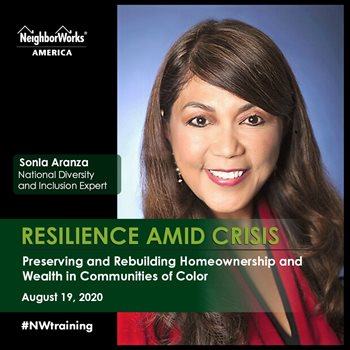Black homeownership rates continue to lag behind those of the white community. This is a gap that the affordable housing and community development fields have strived to close for generations. And the issue hasn't gotten better over time. In fact, communities of color are consistently among the hardest hit during economic downturns.
According to results from the NeighborWorks America's recent affordable housing and financial capability survey, 44% Black individuals reported delaying steps toward owning a home, compared with 29% of the overall population. The survey also found that only 40% of Blacks owned homes, a decrease of 8% since last year's survey. But the survey also showed that people are hungry for resources that can help them, including classes or coaching from nonprofit organizations.
As part of NeighborWorks' ongoing efforts in this area, the recent inaugural NeighborWorks Virtual Training Institute (VTI, Aug. 17-21) included a two-day symposium, Resilience Amid Crisis: Preserving and Rebuilding Homeownership and Wealth in Communities of Color, where speakers and participants discussed how to close the homeownership gap for minority communities. Part of the work of pursing racial parity in homeownership and accessibility includes educating and re-educating ourselves when it comes to society's, as well as our own, cultural and racial intelligence.
Sonia Aranza, a nationally known diversity and inclusion strategist, told her audience during symposium's kickoff session that the work also involves our own epics, or stories. She urged event participants to consider their own epics as they approach the issue of affordable housing for communities of color. "Every person we're privileged to meet comes from an epic," Aranza told the crowd. "What is your epic?"
Aranza's epic begins with her parents, who grew up in the Philippines and worked hard and against all odds to get their educations. They traveled from the Philippines to Hawaii and settled in a working-class neighborhood of other immigrants.
They worked two jobs each, she said, and "to imagine owning your own home was a wild imagining. But my parents dreamed the unimaginable, not just for themselves, but for us: my sister and I.
"Your story doesn't begin with you," she said. "My story doesn't begin with me." But every person we're privileged to meet has a story and every story is different, she told symposium participants.
 It's important to understand stories so that we can understand the complexity of the lenses through which we see when we talk with others, work with others, and when, as staff engaged in nonprofit work, we try to help others, Aranza said. "You don't see the world as it is; you see the world as you are." Emotional and cultural intelligence are inextricable, she added, telling the group, "We must learn, unlearn and relearn about each other."
It's important to understand stories so that we can understand the complexity of the lenses through which we see when we talk with others, work with others, and when, as staff engaged in nonprofit work, we try to help others, Aranza said. "You don't see the world as it is; you see the world as you are." Emotional and cultural intelligence are inextricable, she added, telling the group, "We must learn, unlearn and relearn about each other."
Aranza, a global speaker and facilitator specializing in cross-cultural strategies, diversity and leadership, described the world as being in a state of VUCA – volatility, uncertainty, complexity and ambiguity. That's especially heightened now, she said, as we deal with a health crisis, an economic crisis and a justice crisis.
As we work through these crises, it's important to understand that we all have biases. "The majority of our biases are unbeknownst even to ourselves," Aranza said. "If we don't take the time to explore and investigate what they might be," those biases will keep returning.
"We have to do the inner work," Aranza said. "Never forget the power of inner work."
Aranza offered three action steps as we interact with those around us and work toward housing equality:
- Seek those who make you see things differently.
- Do your inner work. "You can only take others as far as you have gone," she said.
- Advance your knowledge of diverse people. Reading books you don't normally read or watching documentaries you don't normally watch will help with that knowledge. "Be curious," Aranza said. "Connect with people and learn about their epic."

